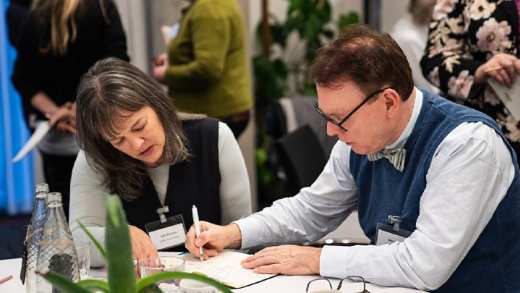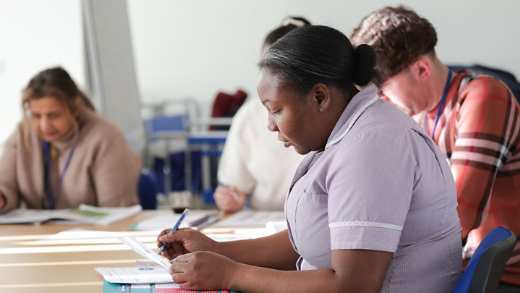2024 Foundation partners

Refuge: Removing barriers to economic abuse casework
Refuge is the largest specialist support service in the UK for women and children experiencing domestic abuse.
Economic abuse affects nearly 1 in 6 people in the UK and involves behaviours often difficult to identify, even for those experiencing it. As perpetrators increasingly use digital platforms to perpetrate coercive control, economic abuse often intersects with technology-facilitated abuse, making survivor support needs more complex.
The Foundation’s funding will help Refuge support an additional 360 survivors with complex cases of tech and economic abuse each year. Insights from this critical work will inform casework across frontline services and the National Domestic Abuse Helpline, empowering more survivors to escape abuse and regain financial independence.
By deepening their understanding of abuse, the partnership will directly enhance Refuge’s awareness-raising and campaigning efforts, including their annual Tech Safety Summit.

New Economics Foundation and the Swoboda Centre: developing a united vision to unleash the potential of credit unions to transform financial resilience in Britain
Credit unions are member-owned financial co-operatives that provide a range of financial services that make a significant contribution to the financial wellbeing and inclusion of their members.
Over recent years, the financial security of many low- and middle-income households has weakened. Technology has changed how people borrow and save. Many people end up paying high levels of interest on loans that they need to get by, and struggle to put enough money aside to give them a buffer.
The credit union sector could play a much larger role in helping to build financial inclusion and resilience. However, the path it takes to expand its services across communities is unclear.
The New Economics Foundation and Swoboda Research Centre are working with the credit union sector to co-create a 10-year vision and roadmap for the credit union movement that aims to identify and capitalise on opportunities to grow.

ClearScore and The Money Charity: understanding the impact of financial education on financial wellbeing
ClearScore, a financial marketplace platform, in partnership with The Money Charity, a financial capability charity, are undertaking a year-long study which aims to understand the impact of financial education on financial wellbeing.
The study, conducted through the ClearScore app with around 5,000 ClearScore users, is funded by the Aviva Foundation.
ClearScore users in the study will be presented with different types of financial education and then monitored against a control group to identify any improvements in their financial capability, credit score, wider credit worthiness, and ultimately their financial resilience and wellbeing.
The study has the potential to measure the impact of financial education, not just on an individual’s financial behaviour, but ultimately on access to credit and potentially even wider financial inclusion.

Money and Mental Health Policy Institute: Data-sharing for good: transforming financial wellbeing for people with mental health problems
Money and Mental Health works to break the link between mental health problems and financial difficulty. Their goal is to advance understanding of the connection between the two and improve the lives of people with mental health problems, especially regarding their finances.
The Foundation’s support will help Money and Mental Health to explore how data-sharing between essential services, government and local authorities could transform financial wellbeing for people in vulnerable circumstances, by better enabling them to access the support they need to thrive.
This project will develop a blueprint for a ‘tell us once’ service to empower individuals with mental health problems and consult relevant sectors to create a shared vision for transforming data-sharing.

Citizen’s Advice: National Red Index: a tool to measure the real impact of poor living standards
Citizens Advice aims to deliver free, impartial and confidential advice - giving people the knowledge and confidence they need to find their way forward.
With the Foundation’s support, they will be developing their ‘National Red Index’ - a tool that uses Citizens Advice’s unique data to estimate how many people in Britain can’t afford their essentials, and understand what policy changes are needed to fix this.
The Index will develop a clear picture of financial resilience based on real income and expenditure data from people at the sharp end of living standards. The Foundation’s funding will help Citizens Advice to strengthen the model, and their influence, to drive the debate around living standards, leading to more effective policy making.

Include Youth: Give and take scheme- money matters
Include Youth supports children and young people in or leaving care, from disadvantaged communities or whose rights are not being met, to improve employability, personal and social development, enhancing inclusion, integration, and good relations.
The Foundation’s support will help Include Youth support 450 young people within Northern Ireland over three years.
Their project takes a three-pronged approach to supporting the needs of care experienced young people. This holistic approach is essential for young people, as discussing finances alone won’t work. This includes financial education, providing ongoing support to young people, and engaging and influencing the financial services sector and key decision makers to address the financial challenges that young people face.

Future Projects: Money matters – future resilience
Future Projects aims to tackle poverty, deprivation and disadvantage in Norfolk.
The cost-of-living crisis has had a significant impact on disadvantaged communities in Norfolk, with more families falling into rental arrears and problem debt, including high numbers of previously stable households.
The Foundation’s funding will help Future Projects to establish proof-of-concept for a new model which combines early-intervention support with financially incentivised debt/arrears reduction goals, to embed positive attitudes and habits and achieve sustainable financial resilience. This project is primarily targeted at those in, or at risk of falling into a ‘negative budget’ – where essential expenditure exceeds income.
The financial support that Future Projects provides aims to reach over 300 people over three years, which will be delivered alongside radio shows and podcasts that provide local tips and skills to help people manage their money matters.

Aston University: Personal finance decision making, and UK ethnic minority led small businesses
The Centres for Personal Financial Wellbeing (CPFW) and Research in Ethnic Minority Entrepreneurship (CREME) at Aston University, the Centre for Business in Society (CBiS) at Coventry University, and Citizen’s UK, have formed a consortium to better understand and build the financial resilience of ethnic minority-led small businesses.
This project brings together a unique mix of researchers and practitioners with expertise and track record in exploring small business ownership and financial resilience, and developing practical solutions to make a difference.
The project aims to better understand the challenges that business founders from minority ethnic backgrounds face when they start and then maintain their ventures.
Using this insight, a suite of interventions with be developed and piloted, focussing on how best to minimise risk to personal and family financial resilience when starting and growing new businesses.

Surviving Economic Abuse (SEA): The Compass Project
SEA is the only UK charity dedicated to raising awareness of economic abuse and transforming responses to it. Everything they do is informed by the Experts by Experience Group of over 100 women with lived experience.
With the Foundation’s support, they are working with partners in two locations to develop a model of economic advocacy as part of the ‘coordinated community response’ to domestic abuse. This project aims to ensure that local services work together to help victim-survivors of economic abuse to (re)build financial resilience. At present, many services prioritise immediate physical safety, yet do not recognise and respond to the harm of economic abuse which can often prevent a victim-survivor from safely leaving the abuser or force them to return.
Over two years, the project plans to support approximately 1,750 cases where economic abuse is identified. Lessons learned from this work will be used to influence the policies and practices of organisations that play a role in supporting victim-survivors.

The Trussell Trust: The Organising Programme
The Trussell Trust supports a network of more than 1,300 food bank centres serving every type of community across the UK. Through this network, they provide practical, community-led support for people facing financial hardship and campaign for the systemic change required to end the need for food banks.
The Foundation’s support will enable the Trussell Trust to build their ‘organising programme’ – an initiative designed to support food banks to identify and implement ways to build the financial resilience of the people they support through locally-led campaigns. The funding will be used to build the food bank team’s capacity and skills needed to help them develop and deliver impactful campaigns.
This programme will operate across several locations in the UK, with the Trussell Trust overseeing and monitoring the overall impact, and utilising these insights to influence local change for national impact.

Mental Health Innovations with PayPlan: Shout – Supporting financial wellbeing
The mission of Mental Health Innovations (MHI) is to improve the mental health of the UK population through the use of technology. Their pioneering service 'Shout' is the UK’s only free, 24/7, confidential text service for anyone who is struggling to cope.
With the Foundation’s support, MHI is strengthening their response to supporting people experiencing mental health and financial challenges. This partnership recognises that, without understanding and supporting the root causes of both money and mental health challenges, the impact of tackling one without the other, may be limited.
Together with PayPlan, MHI will help individuals in financial distress access immediate mental health support, while signposting those suffering with poor mental health due to financial issues to relevant services. Research will inform a campaign to help people improve their financial wellbeing, as well as influencing the future activities and strategies of different stakeholders with a responsibility for supporting the mental and financial wellbeing of those who need it the most.

Turn2us: The Turn2us Response Fund
Turn2us is a national charity, whose vision is that everyone in the UK has financial security so that they can thrive. They provide practical support and information to those of us facing financial shocks and challenge the systems and perceptions that cause financial insecurity.
The Foundation’s support will enable Turn2us to build the financial resilience of around 350 people in Wales over two years. The project aims to provide immediate financial support to individuals experiencing financial distress, providing them with the ‘breathing space’ they need to enable them to identify and work towards longer-term financial goals.
Evidence from this programme will increase understanding of the structural barriers holding people in financial insecurity, and how best they can be addressed.
2023 Foundation partners

Autistica: helping autistic people and families in the UK build financial resilience and wellbeing
Autistica develop evidence-based solutions to the issues that matter most to the autistic community; shaping better services and influencing policymakers to make change happen for 1.2m autistic people in the UK.
With the Foundation’s support, they will be creating two moderated digital platforms: an ‘Everyday Tips Hub’ to support autistic people and their families and a ‘Professionals Hub’ to support organisations and professionals working with autistic people.
The Hubs will host evidence-based and community-sourced resources and tools on key priority topics, including financial resilience to empower autistic people and their families to develop financial skills and wellbeing; and support financial experts to better understand how to cater inclusively for autistic customers.

Moneyline: improving financial resilience through trialling variable reoccurring payments
Moneyline is a not-for-profit organisation, offering financial services to some of the lowest income households in the UK. Since 2002, they have issued over £100m in loans to 55,000 customers, and have opened 28,000 savings accounts with over £13.5m in savings deposited.
With funding from Aviva Foundation, Moneyline will be trialling a new payment method for a segment of their customers who are often financially excluded, for whom Direct Debits often don’t work.
They are planning to give customers more control over their finances by offering them the ability to make variable repayments on their loans. This involves providing an interest calculator, allowing them to see how much money they could save by making more frequent, small payments.
Giving organisations more insight to flexible ways to pay should open the door to offering their products to a wider group of people and in turn reduce financial exclusion.

Living Wage Foundation: growing the living wage in the North-East
The Living Wage Foundation tackles in work poverty by encouraging UK employers to play their part in ensuring that workers earn enough to live on, and participate in family and community life. Over 13,500 are accredited as Living Wage Employers, together they have put over £2bn back into the pockets of low-paid workers.
The Aviva Foundation's funding will support the Living Wage Foundation to build a regional programme in the North-East. The region has one of the highest percentages of workers earning below the real Living Wage and the third highest levels of low-paid jobs in the UK.
The Foundation’s funding will be targeted towards intensifying the Living Wage Foundation’s campaigning in the North-East to build financial resilience for workers who need good work and a wage that meets living costs. This project aims to increase the number of accredited Living Wage Employers in the North East by 500 over three years.
2022 and before Foundation partners

Young Enterprise: supporting the financial capability of young people
Young Enterprise is a national charity that helps young people to earn and look after their money – now, and in the future.
In 2022, through support from the Aviva Foundation, they created and piloted the RAISE app (https://raise.y-e.org.uk/). Using real-life scenarios, the interactive digital resource helps young people better understand the risks, benefits and impact of investments and long-term savings, building knowledge, skills and confidence to manage money well.
Over 2023-25, through its Young Money brand, Young Enterprise will be working with schools, families and communities to scale up the RAISE app – aiming to build the financial resilience of 10,000 to 15,000 young people aged 14-18.
